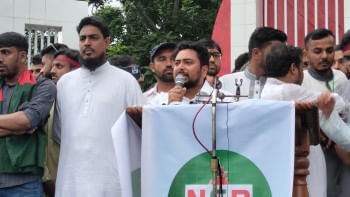Let’s show zero tolerance for pollution

Environmental issues related to the ready-made garment (RMG) sector of Bangladesh appear to have taken a back seat in recent years. Much more focus has been placed upon social aspects, including factory safety, workers' welfare, and pay and employment conditions in the RMG factories. The reason for the shift away from the environment and pollution as a talking point is largely because of the progress the industry has made in reducing its environmental burden.
Around a decade ago, Greenpeace, an international direct-action group, began a campaign against the use of potentially hazardous chemicals in fashion supply chains. Many chemicals are used in supply chains, particularly in the dyeing and finishing of clothing. Greenpeace's campaign focused on reducing the amount of hazardous chemicals used, and put the spotlight on how dyeing and finishing units dispose of their effluent into the environment.
The campaign had a huge impact. It forced fashion retailers—our customers—to look closely at their supply chains and this, in turn, made garment makers as well as dyeing and finishing units become far more compliant regarding this issue.
The net result, a decade later, is a cleaner industry with a reputation for environmental management. Bangladeshi RMG manufacturers have been leaders in this area.
Why am I writing about this? That's because a recent news report captured my attention. The story, which was on pollution linked to textile dyeing factories in Dhaka's Shyampur area, illustrates perfectly why we can never be complacent when it comes to pollution.
According to the report, dyeing factories in Shyampur have been polluting the Buriganga River by releasing raw liquid waste directly into its water. Experts warn that if this is not addressed in time, the local residents could suffer from serious health hazards. We also know from experience that textile pollutants can harm aquatic animals and damage ecosystems. Reportedly, the river is already in a poor state. The researchers who carried out the study claim that a total of 80-100 dyeing factories in Shyampur are releasing their liquid waste chemicals into the river.
So, what is being done to tackle this issue?
Our RMG sector has taken giant strides on environmental issues in recent years. This progress cannot be allowed to be undone by a lack of proper regulatory oversight or investment in equipment and technology to effectively treat effluent before it is released into our water bodies. Sophisticated technology to treat waste water has existed for decades. Why is it not being used in this scenario? Why are we letting our rivers be poisoned, threatening local lives and potentially soiling our hard-won international reputation?
Reading the news report further, the impression I got was that a lack of planning and coordination between the authorities and the local industry had led to this situation.
There are calls for a common effluent treatment plant (ETP) for dyeing factories in Shyampur as an absolute emergency to save the river from pollution. But the factory owners are also said to be complaining that the Dhaka Water Supply and Sewerage Authority (Wasa) is not providing land for such a plant. From the story, it seems none of the various government authorities involved is taking responsibility for the situation.
We cannot afford to have a situation like that regarding an issue as important as environmental pollution. How much would it cost to set up a central ETP in the area? And why is it not happening immediately?
Bangladesh will always be under the spotlight where sustainability issues are concerned. We have never managed to shake off the "baggage" of the past on these issues, and it would only take a few international media outlets to pick up this issue to cause our industry huge problems. Reputation is hard-earned, but can be lost in the blink of an eye. RMG exports account for more than 80 percent of all export revenues in Bangladesh. This vital revenue source cannot be put at risk simply because of disagreements over whose responsibility it is to implement proper technology in a particular locality. This may be a local issue, but it could have major international implications given that our customers do not just ask for proper environmental oversight in their supply chains, but they absolutely insist on it as a perquisite for doing business. This is the industry in which we operate.
The powers that be need to sit down and sort out these issues with urgency. If there are questions over whose responsibility it is to install ETPs, they need to be resolved. We all need to know our roles, and we all need to understand as individuals that our livelihoods depend on getting these things right. Bangladesh's RMG sector has come too far to start going backwards now where the environment is concerned.
Mostafiz Uddin is Managing Director of Denim Expert Limited, and Founder and CEO of Bangladesh Apparel Exchange (BAE) and Bangladesh Denim Expo.

 For all latest news, follow The Daily Star's Google News channel.
For all latest news, follow The Daily Star's Google News channel. 



Comments